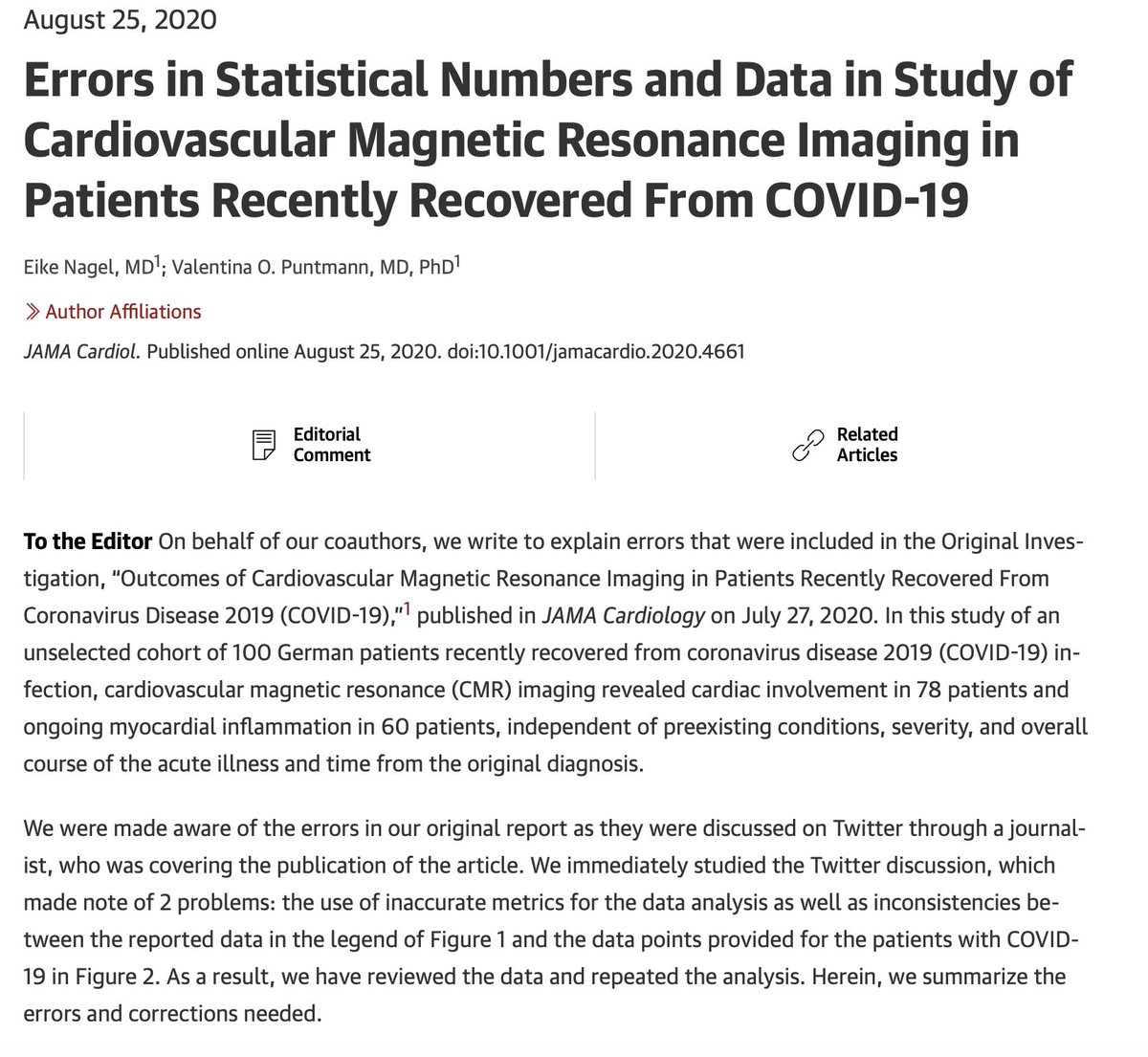On July 25th a paper came out suggesting that 60% of #COVID19 patients might experience myocardial inflammation. Such extensive sequelae would have been extremely concerning and the paper was understandably widely shared and discussed.
(1/10) https://jamanetwork.com/journals/jamacardiology/fullarticle/2768916">https://jamanetwork.com/journals/...
(1/10) https://jamanetwork.com/journals/jamacardiology/fullarticle/2768916">https://jamanetwork.com/journals/...
Some of the numbers in the paper did not seem to add up, and the results felt somewhat implausible. It was criticised on twitter both on statistical and biological/medical grounds (for an entertaining but scholarly take, see below).
(2/10) https://twitter.com/ProfDFrancis/status/1298617466801790976">https://twitter.com/ProfDFran...
(2/10) https://twitter.com/ProfDFrancis/status/1298617466801790976">https://twitter.com/ProfDFran...
The paper has now been corrected, allegedly. Though, somewhat unsatisfyingly, while the authors claim the results are & #39;unchanged& #39;, the corrected version has not been uploaded on the JAMA site and interested readers will be directed to the & #39;uncorrected& #39; version.
(3/10)
(3/10)
Scientists are humans and can have strong priors, which is not necessarily a bad thing - we could call it & #39;scientific intuition& #39;). Science is also an iterative process. Though, this episode exemplifies problems in the scientific process during the #COVID19 era.
(4/10)
(4/10)
Scientists have to be critical of their results, level-headed, and cannot use & #39;maximum doom & gloom& #39; as a sole prior, particularly so when results feel implausible (and samples are small and possibly biased). The same should be true for journal editors and peer reviewers.
(5/10)
(5/10)
This episode highlights the stress the science publishing system is under in the #COVID19 era. It is interesting, once again, that some of the main flaws were picked up by & #39;reviewers" on twitter. This could have been alleviated if the authors had submitted a preprint.
(6/10)
(6/10)
"Corrected& #39; or not, this paper will remain problematic. The design does not allow disentangling whether some #COVID19 patients suffer from myocardial inflammation (MI) due to the infection, or whether MI may be associated to risk factors likely to lead to severe #COVID19 .
(7/10)
(7/10)
There is no doubt that some #COVID19 patients will take months if not years to fully recover, and some may suffer from long-term sequelae; this is true for any severe infection, whatever the pathogen. What remains unknown is if #COVID19 is unusual in this respect.
(8/10)
(8/10)
The extent of long-term #COVID19 sequellae is a serious issue, which necessitates thorough, robust and dispassionate inference. Studies such as this one are not helpful, as their initial public reception, and sorry aftermath only entrenches people in their preconceptions.
(9/10)
(9/10)
For society to deal with #COVID19, we need less drama and more reason. Scientists have a prime responsibility in this. I encourage all my colleagues to question their priors (whatever they are), and try to contribute to human knowledge rather than chasing scoops.
(10/10)
(10/10)

 Read on Twitter
Read on Twitter


